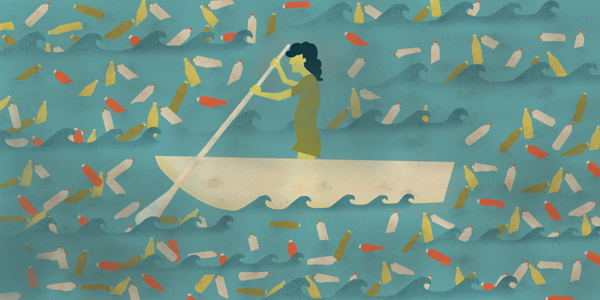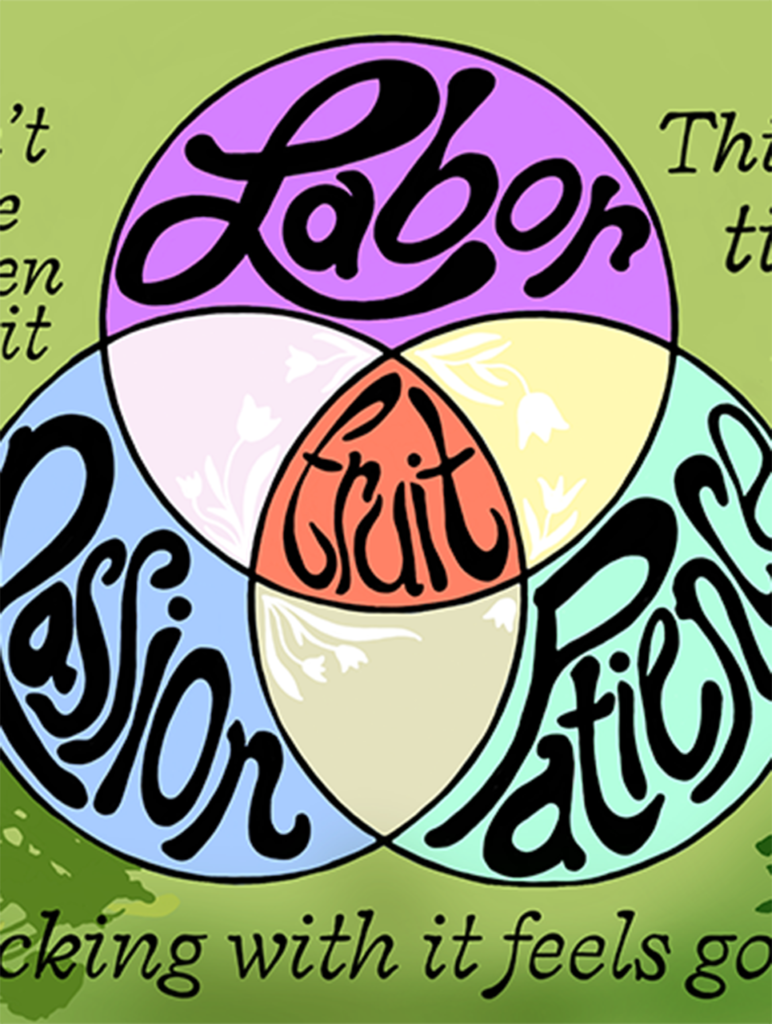Illustration by Chelsea Manheim
Let’s Trash the Idea of Garbage
by Jerry Silberman
Question: How much of my household waste can I recycle, and does it decrease energy and materials use?
The Right Question: Why do I have waste, anyway?
If you are my age or older, you probably remember when beer and soda came in bottles that you had to bring back for the deposit. Milk bottles went back to the milkman, and you might have earned some pocket change by finding discarded bottles and returning them for a few cents each. In the early ’60s, big soda manufacturers realized that the cost of the bottle, and cleaning it, cost more than the soda inside it, and that profits would jump if the bottle was discarded instead of reused. Manufacturers realized that they could promote this change by advertising for its modernity and convenience of throwing an empty container away. Don’t keep track of the bottles, or worry about lugging them back to the store—just toss it!
Disposables caught on swiftly and completely, but there was collateral damage. Solid waste volumes spiked, costing cities money. Roadsides became de facto trash receptacles. Conservationists decried the waste of resources. The solution was recycling, which the soda industry embraced, especially since it cost them nothing, and sometimes made money for them. For other industries, recycling was always part of the business. Steel, aluminum and other metals—relatively unaffected by repeated use and amenable to reshaping without losing their properties—have always been recycled in very high percentages. In part, this is because recycling metals saves enormous amounts of energy as compared with producing them from ore. Eighty to 90 percent of steel is recycled. Paper and glass have a variety of uses, but as you get into plastic, true recycling—which involves reusing the material in a similar way to its original use or through many incarnations—gets very dicey. Most plastics have one reincarnation before they are unusable.
Every product that we use has an energy cost. Many studies have been done on the “life cycle energy costs” of different products. How much energy does it take to make a throwaway, recyclable plastic bottle for Coke (or your favorite bottled water), deliver it to the point of sale, and then reprocess it into filler for road asphalt or industrial carpet? How does that compare with a glass bottle that we washed and refilled 100 times before it became unusable, before it was melted down to cast a new bottle?
How does either compare with a drink of tap water from the sink in a glass that’s been on your shelf as long as you can remember, factoring in the cost of purifying the water and later running it through a sewage treatment plant? (Speaking of recycling, much of Philadelphia’s drinking water has been recycled up to seven times before it gets to us. Check out the displays at Fairmount Water Works!)
The slogan “Reduce, Reuse, Recycle!” entered the environmental lexicon decades ago, but it has largely been ignored. We have continued to increase consumption, and minimize reuse, while focusing on recycling. Reducing consumption clearly reduces energy use, by whatever amount would be necessary to produce (and dispose of) whatever was not used. It’s always the best choice.
Reusing generally has a linear relationship to reduction in energy consumption, since it may reduce the need for production. Reuse, which can be anything from a returnable bottle to taking your own containers to fill at the bulk bins at a grocery store, is resource and energy efficient.
The energy saving connection with recycling, however, is much more tentative. For those materials where recycling is clearly less energy intensive than obtaining fresh supplies (steel and aluminum, for example) the industry doesn’t need public encouragement.
Little research is available on the energy cost of recycling plastic from, say, soda bottles into synthetic carpet fibers; my hunch is that it is an energy expensive process. Recycling where there is not a clear energetic and economic incentive to do so only occurs with substantial subsidies, which include the public expense involved in collecting and in some cases sorting recyclables, and the volunteer labor of individuals who take the time to collect and sort materials in many recycling operations that depend on volunteer labor.
Recycling should be our choice of last resort, (or second to last resort, if the other choice is a landfill.) Yet there have even been programs that pay people based on the volume of material they recycle, such as the Philadelphia Streets Departments program with Recyclebank—thus stimulating the use of disposable packaging.
Natural systems have no waste, only cycles of use as matter is continually repurposed with the help of energy arriving from the sun—energy that eventually dissipates back into space. Modern humanity has developed a concept of waste that threatens our ability to live on the planet, and that is why, among other changes, we must boycott all beverages and food products that come in single use containers.
Jerry Silberman is a cranky environmentalist and union negotiator who likes to ask the right question and is no stranger to compromise.












it becomes harder and harder as a consumer to shop ‘ethically’. I am trying to switch from plastic packaging to pasta in cardboard packaging etc, and find most if not all supermarket breads are in plastic, it has to be promoted at point of manufacture and packaging, consumers can only do so much
Don’t buy it. Stop blaming manufacturers.
Refuse
Reduce
Reuse
Re-purpose
Recycle-I agree! People think that if they recycle, they’ve done their share and wiped their hands of the problem.
We Must #Notwast & #overconsumption is our Damage, So we Must too Be the Change
Reusing is definitely preferable to recycling, but what about the bulk food packaging?While in the bulk bin aisle of Whole Foods I saw a staff person refilling the bin of dried cranberries from a huge vacuum-packed plastic bag. Even if I then fill up a reusable mason jar with that dried fruit, there is still a huge, thick plastic bag that doesn’t get reused. Presumably Whole Foods will recycle it, but that’s why I’m not entirely convinced that bulk bin purchases are more eco-friendly. Is the weight of that extra large plastic bag less than the sum of an equivalent amount of individual dried cranberry bags? I don’t know. If not, or even if less it might still be more wasteful, because at least anecdotally I usually see people using plastic produce bags in the bulk aisle, and not reusable containers brought from home. I certainly hope it’s more eco-friendly but I’d love to see some studies with data that show more conclusive evidence. If you have or know of such studies please share them here! I would love to be wrong about this.